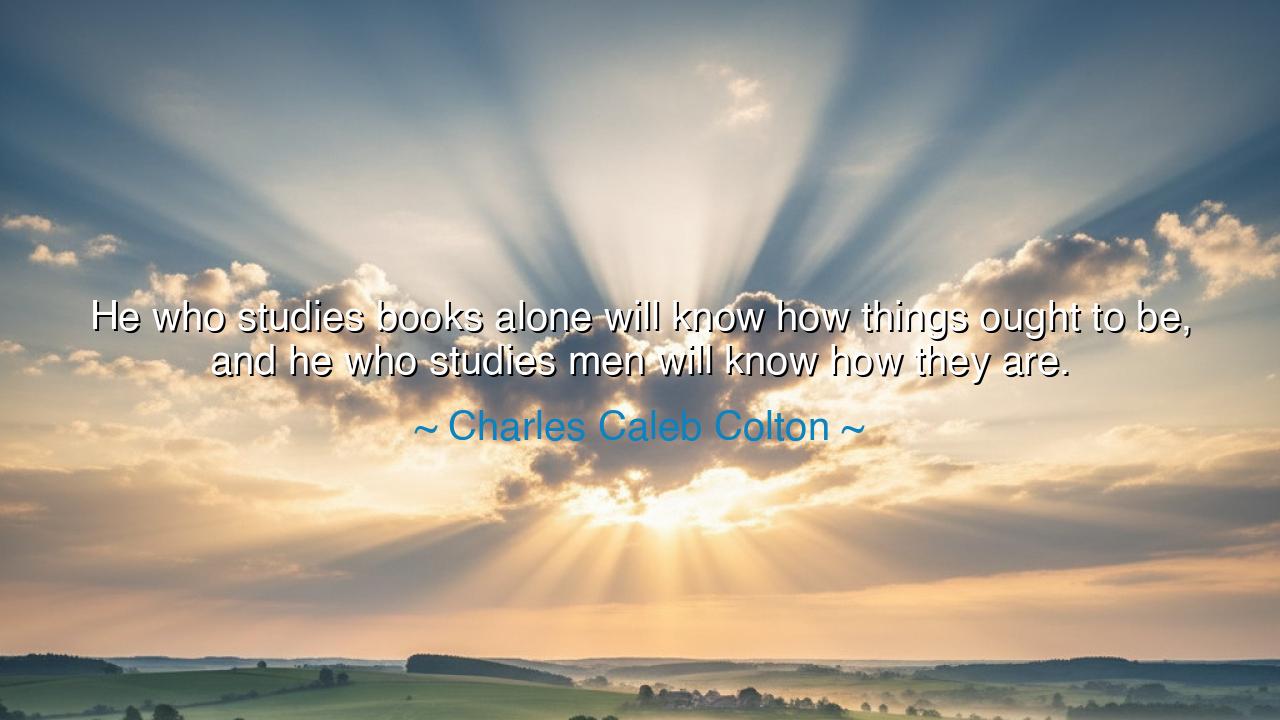
He who studies books alone will know how things ought to be, and
He who studies books alone will know how things ought to be, and he who studies men will know how they are.






“He who studies books alone will know how things ought to be, and he who studies men will know how they are.” — Thus wrote Charles Caleb Colton, the English clergyman and moralist, whose reflections upon the human condition have echoed through centuries. His words stand as a warning to those who seek wisdom only in ink and parchment, and as a call to those who would balance learning with experience. In this brief sentence lies the eternal tension between the ideal and the real, between the perfection of thought and the imperfection of life. For books may teach the laws of virtue, but only life reveals the limits of mankind.
The origin of this quote is found in Colton’s book Lacon: or Many Things in Few Words, published in 1820, a collection of reflections born from deep observation of both literature and society. Colton was no ivory-tower philosopher; he was a man who had lived among people, who had seen hypocrisy in high places and folly in low ones. In his time, as in ours, many scholars mistook learning for wisdom, and knowledge for understanding. Colton, discerning this illusion, reminded the world that wisdom is not only found in books, but also in men — in their passions, contradictions, and struggles. To study books is to know the world as it should be; to study men is to know it as it is. True wisdom is found in the union of both.
The ancients knew this truth well. The philosopher Aristotle, though a lover of reason, was also a keen observer of life. He taught that ethics cannot be learned from theory alone; it must be lived, practiced, and felt in the heat of real experience. Likewise, Socrates walked not among scrolls, but among people, speaking to craftsmen, soldiers, and statesmen in the marketplace. He knew that the knowledge of the heart cannot be written — it must be drawn out in conversation, in the friction of thought and the testing of character. Thus, even the greatest minds understood that books are the beginning of wisdom, but not its end.
Consider also the story of Niccolò Machiavelli, the Florentine statesman who, after years of public service, was cast out of politics and into exile. There, he turned to the study of history and philosophy, and wrote The Prince, one of the most profound studies of men as they are. From his observations, he learned that while philosophers dreamed of noble republics, rulers dealt in ambition, fear, and necessity. He saw that the world is not governed by ideals, but by forces — pride, hunger, desire, and survival. In this, Machiavelli embodied Colton’s wisdom: he had studied both books and men, and so he understood the full truth — not the dream of virtue alone, nor the despair of cynicism, but the fragile bridge between them.
To study books alone is to see the world as a blueprint — neat, orderly, and just. But when we step beyond the page, we find a world full of contradiction: good men who falter, wicked men who rise, and events that defy all reason. To see this and not despair requires wisdom — the kind that grows not from reading, but from living. Yet, to study men without books is equally dangerous. Without ideals, we lose the compass that points toward what ought to be. Without learning, experience becomes chaos; without experience, learning becomes illusion. It is the balance between knowledge and observation that gives birth to understanding.
Colton’s quote, then, is both a critique and a guide. It calls us to look beyond the safety of theory and enter the messy world of human reality. It warns us that the scholar who never leaves his study may know the structure of justice, but not the beating heart of compassion; that the philosopher who knows every virtue in name may still fail to practice one. Likewise, it warns the worldly man who scorns study that without ideals, he will drift like a ship without a star. Wisdom demands that we hold both the mirror and the book — to read, and to see, to think, and to feel.
Therefore, let this be the lesson: read deeply, but live more deeply still. Seek knowledge in books, but test it in the world. Listen to the poets and philosophers, but also to the laborer, the mother, the stranger in the street. For wisdom is not confined to parchment — it walks beside you every day, clothed in the lives of men. Study how the world ought to be, for it will give you purpose. Study how it is, for it will give you understanding. And when you can hold both truths in your heart without despair, you will know what few ever learn: not merely the knowledge of scholars, but the wisdom of the wise.
For the book teaches us ideals, but life teaches us truth — and between them lies the path to enlightenment.






AAdministratorAdministrator
Welcome, honored guests. Please leave a comment, we will respond soon